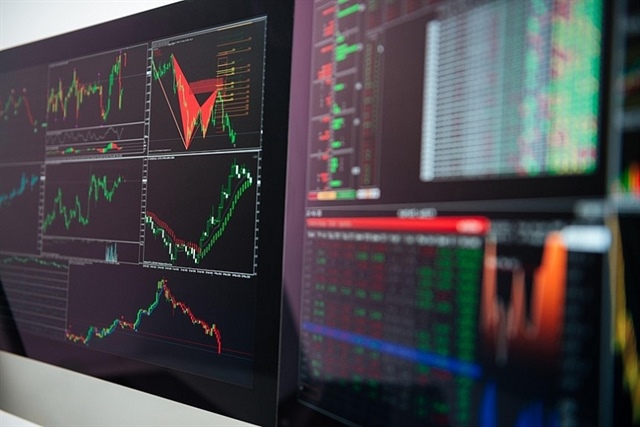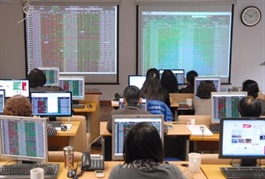Stock market reacts sharply to US tariffs
Stock market reacts sharply to US tariffs
President Donald Trump’s decision to impose new tariffs worldwide has triggered a global stock market sell-off, sending the VN-Index into its steepest decline in a year.
The VN-Index plunged sharply at the opening session, shedding over 60 points within less than an hour of trading, retreating to nearly 1,255 points. The market was awash in red, with a significant number of stocks plummeting, many hitting their floor prices across various sectors.
A wave of panic selling, driven by concerns over the newly announced tariffs, fuelled a surge in market liquidity. Both trading volume and value soared, reaching levels typically seen in a full trading session on previous days.
As of 10am on April 3, the VN-Index had lost over 60 points, or 4.76 per cent, with a substantial number of stocks facing sell-offs at floor prices. This sharp decline underscores negative investor sentiment towards the market, even as the full sector-specific impact of the new tariffs remains unclear.
By the end of the morning session, selling pressure intensified further after the midday break, dragging the VN-Index down by 87 points to 1,230.
|
On the Ho Chi Minh Stock Exchange (HSX), the sell-off was widespread, with over 700 stocks falling, including more than 200 stocks hitting their floor prices.
Industrial real estate stocks, once expected to benefit from FDI inflows, saw a steep decline, with stocks like KBC, IDC, BCM, DXG, and DIG all plunging to their lower limits.
Similarly, material-related sectors, including steel (HSG, NKG, TLH), fertilisers (DCM, DPM), and chemicals (CSV), also experienced severe declines.
Export-driven agricultural and seafood companies, directly affected by the new import tariffs, witnessed sharp sell-offs, with stocks such as MSN, DBC, PAN, IDI, VHC, and FMC all hitting their limit-down levels.
Foreign investors continued to offload Vietnamese equities, recording a net sell value of $88 million.
The most heavily sold stocks included MBB with $20 million, TPB with $12 million, FPT with $8 million, and VNM with $8 million.
Pham Luu Hung, chief economist and director of SSI Research, provided his latest insights on the Trump administration’s move.
According to Hung, the situation remains uncertain. The initial 10 per cent tariff is set to take effect on April 5, while countermeasures could follow by April 9. However, the specific list of affected goods remains unclear, requiring further details to assess the exact sectoral impact.
“The 46 per cent tariff rate for Vietnam and 54 per cent for China seem to serve as upper limits for negotiation rather than permanent rates. Vietnam has proactively demonstrated goodwill in trade relations, such as reducing tariffs on 14 product categories, and could introduce more favourable policies. Notably, the government also granted Starlink operational approval shortly after the Vietnamese Minister of Industry and Trade’s visit to the US,” Hung said.
Hung emphasised that foreign investors perceive trade-related risks as the most significant concern for Vietnam, leading to sustained net selling. However, once the worst-case scenario is fully priced in, investors will reassess potential opportunities.
“They will evaluate which sectors now offer more attractive valuations. Historically, during the first US-China trade war in 2018, valuations were twice as high as they are now. This suggests that selling pressure may ease soon. While retail investors may remain cautious, long-term investors will view this as a key point to reassess their positions. By April 8-9, when the tariffs take effect, there may even be a turnaround with potential positive developments,” he added.
The market turmoil extended beyond Vietnam, with global stock markets experiencing a sharp sell-off on April 3. At one point, Dow Jones futures tumbled 1,069 points, down 2.5 per cent, while S&P 500 futures lost 3.6 per cent and Nasdaq futures plunged 4.5 per cent.
Shares of multinational corporations slumped, with Nike and Apple both down around 7 per cent. However, the hardest-hit stocks were US import-dependent retailers, such as Five Below (down 14 per cent), Dollar Tree (down 11 per cent), and Gap ( down 8.5 per cent). The technology sector was also battered, as rising risk aversion pushed Nvidia down 5 per cent and Tesla down 7 per cent.
The widespread sell-off followed President Donald Trump’s announcement of sweeping new tariffs. Trump declared a 10 per cent import tariff on all goods entering the US, with significantly higher rates imposed on key trading partners, with Vietnam facing a 46 per cent tariff and China at 54 per cent (a new 34 per cent tariff combined with an existing 20 per cent one).
- 15:25 03/04/2025














































